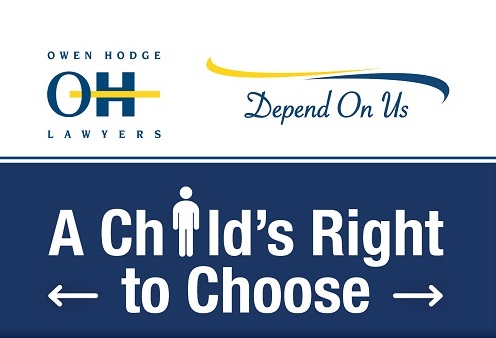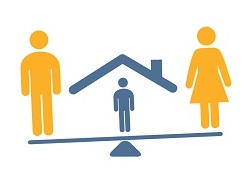
All family law issues in Australia NSW are governed by the Family Law Act. This Act governs all of the areas of family law, including who children will live with during a separation or after a final divorce. In NSW, children remain minors until the age of 18. Hence, there is no set age at which a child may choose to live with one parent or another. Instead, if the children are under the age of 18, section 60CC(3)(a) sets out the factors that the court will take into consideration when deciding a child’s living arrangements.

However, prior to entering the court system, all families are required to attend mediation as the primary form for making child rearing and child care decisions. Unless the family has experienced violence or abuse, it is best for the parents to work together to develop their own parenting plan.
If a family is unable to come to a parenting agreement, then the family can apply for a “parenting order” from the court. At this juncture Family Law Act section 60CC is used by the court as the primary guideline for determining parenting duties. While this section does take into consideration the wants of the child, such desires are not necessarily the controlling factor in where the children will live. Rather, the court takes into account as many as 16 different factors when placing children with the proper parent.
The two primary factors include:

· The child having a meaningful relationship with both parents
· The need to protect the child from any harmful or neglectful behavior or treatment
Additional factors are also considered:
 The nature of the child’s relationship with each parent
The nature of the child’s relationship with each parent
- Which parent has been the primary caregiver, if any
- The opinions of grandparents or other family members who have first-hand knowledge of the child’s interaction with both parents
- Each parents time commitment to the child with regard to decision making, communication and time spent with the child
- The likely effect of changing the primary care giver on the child and/or their siblings
- The capacity of each parent to maintain and care for the child
- The child’s particular views and desires depending upon their age, maturity and ability to articulate their own personal choice without interference or influence.
If the court does decide to take into consideration the express desires of the child, they will do so by having the child interviewed by a family court specialist. This specialist will take time to interview the child and both parents, and possibly grandparents or teachers who have a strong relationship with the child or the family. It is very rare that the Judge themselves will interview the child. Rather the Judge will take into consideration the report submitted by the appointed therapist or family court specialist.
In the majority of cases, after the court has weighed the best interests of the child, and any professional opinions they have requested, the court will give parents an equal share of responsibilities and time with the child. As such, in most cases, both parents are usually determined to be equally legally responsible for the educational, medical, and overall health decisions that need to be made for the child. The balance of the decisions, such as the amount of time each parent will spend with the child, the holiday schedules, school vacation schedules and daily communication and activities schedules, will also be set out in a manner that gives equal time to both parents.

While many children are able to give a sincere and trust worthy statement to the family court social worker, or to family members, regarding how they would like their living situation to be structured, such wishes are not the primary deciding factor for any court. All courts will weigh the surrounding circumstances and use all of the information gathered to make a decision that will create the best living situation for the child.
For further information or inquiries, please contact the offices of Owen Hodge Lawyers. At Owen Hodge, we are always happy to assist clients in understanding the full ramifications of any and all of your legal needs. Please feel free to call us at your earliest convenience to schedule a consultation at 1800 770 780.

 The nature of the child’s relationship with each parent
The nature of the child’s relationship with each parent